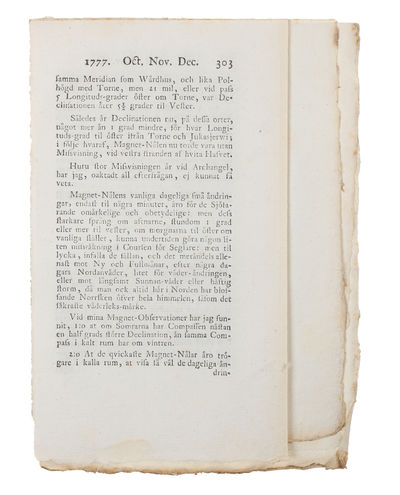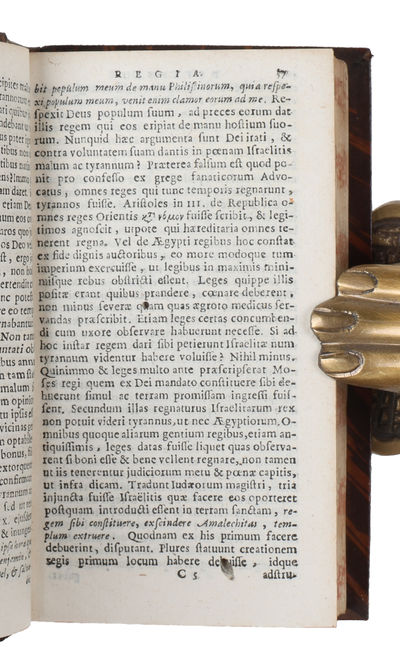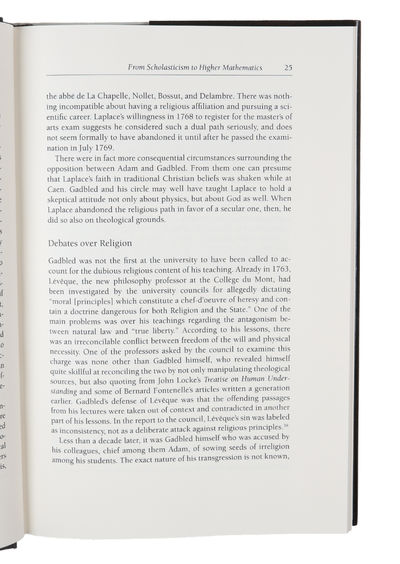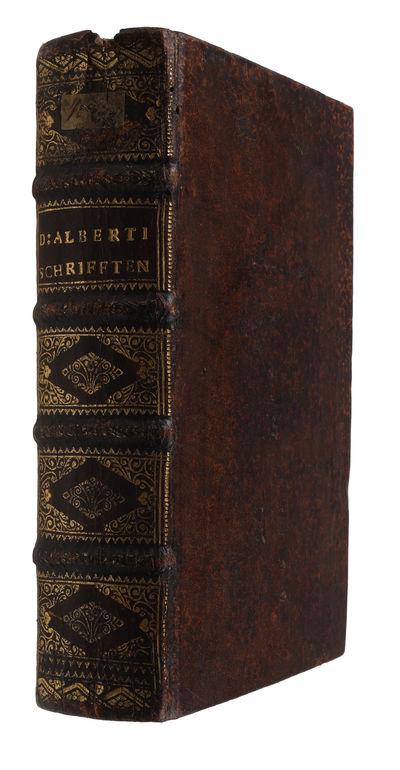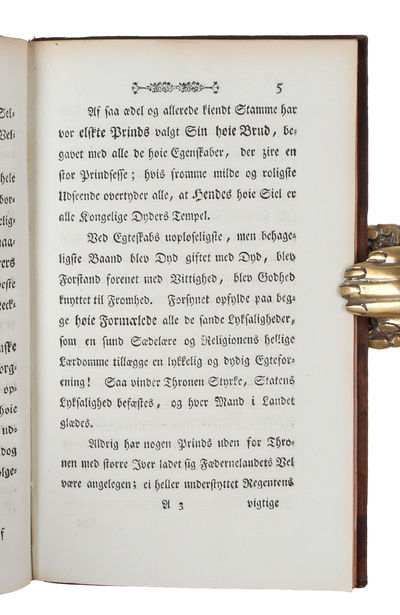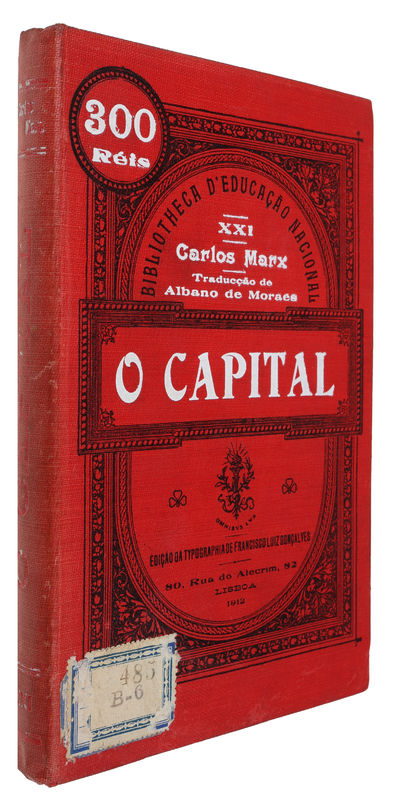HOWITZ, F.G.
Om Afsindighed og Tilregnelse, et Bidrag til Psychologien og Retslæren. - [DEDIKATIONSEKSEMPLAR AF VÆRKET, DER INDLEDTE STRIDEN OM VILJENS FRIHED.]
Herman H. J. Lynge & Søn A/S
lyn61898
Kjøbenhavn, A. Seidelin, 1824. 8vo. Indbundet i et pænt, samtidigt halvlæderbind med enkel rygforgyldning og forgyldt titeletiket på ryg. Øvre kapitæl og ydre false med slid. Kantslid. Hjørner stødte. Med egenhændig dedikation fra forfatteren på forsatsbladet. Trykt på skrivepapir. Ren og pæn indvendig. (4),VIII,117,(1: errata) pp.
Et nydeligt dedikationseksemplar af den sjældne originaludgave af Howitz' vigtigste skrift, - værket, der indledte den danske strid om viljens frihed, den såkaldte Howitz-fejde."Med afhandlingen "Om Afsindighed og Tilregnelse, et Bidrag til Psykologien og Retslæren", indledte Howitz i 1824 det 19. århundredes danske diskussion om viljens frihed." (Koch, Den danske idealisme, p. 183). Howitz mente, at samtidens retslærde (med Ørsted i spidsen) ikke forstod forholdet mellem menneskets normale fornuftstilstand og den afsindige tilstand, og han påbegyndte dermed en diskussion af det juridiske begreb om tilregnelighed, bag hvilket han mente at se Kants frihedslære. På flere fronter foregriber han emner, der forekommer meget moderne. For det første var hans mål, i opposition til Ørsted, at få ændret synet på domme i straffesager, hvor ydre omstændigheder burde siges at kunne svække den sagsøgtes evne til at handle fuldt rationelt, - en foregriben af moderne retspraksis.Samtidig behandler han spørgsmålet om sindssygdom som et spørgsmål om enhver anden legemlig sygdom. Han gør sig til talsmand for en biologisk funderet psykiatri, der sidestiller psykiske lidelser med fysiske lidelser ved at finde sædet for denne type sygdomme i hjernen. Ved at anse afsindighed og dermed også utilregnelighed for en indskrænkning af fornuften eller dens brug skyldet en sygdom i et af legemets organer, konkluderer han blot, at fornuftens indflydelse på den afsindiges handlinger ikke er tilstrækkelig. Ved at betragte sindslidelser som somatiske, dvs. som fysiske sygdomme placeret i hjernen, mener Howitz, at den egentlige utilregnelige eller afsindige tilstand nemt kan adskilles fra den lidenskabeligt bestemte tilstand, og de afsindige udgør ingen forskel fra den øvrige menneskeslægt, men er blot en underafdeling blandt de syge mennesker. "Manglen på fornuftig selvbestemmelse kan foreligge i grader. Med eksempler hentet fra psykiatrien kan Howitz vise, at distinktionen mellem afsindighed og tilregnelighed ikke er skarp, og at der findes en række overgangstilstande mellem normalitet og total afsindighed. Dette medfører, at den frihed, som både Ørsted og Howitz hævder er træk ved det raske og normale menneske, kan foreligge i grader, og at tilregneligheden i overensstemmelse hermed kan være større eller mindre. Når dette er tilfældet, må dommeren også inddrage overvejelser over frihedsgrader i forbindelse med strafudmåling, hvilket Ørsted jo havde benægtet." (Koch, Den danske idealisme, p. 187).Med Hume og Spinoza søger Howitz at gendrive Kants lære om menneskets frihed. Med Hume sætter han lighedstegn mellem forholdet motiv-handling og forholdet årsag-virkning, og således kan der ifølge Howitz når det gælder menneskelige handlinger, heller ikke findes noget, der er uden årsag. Howitz opfattede dog ikke, helt på linie med Hume, denne naturnødvendighed som værende i modstrid med friheden. Der er ingen tvivl om, at et skrift af en art som Howitz' "Om Afsindighed og Tilregnelse" har virket provokerende på den filosofisk idealistiske samtid, der ikke anerkendte nogen form for materialistisk determinisme, og det var nærmest en nødvendighed for at A.S. Ørsted at svare på dette provokerende skrift. Således skriver Ørsted allerede samme år "Et Par Ord; i Anledning af den foranstaaende Afhandling". Fejden, striden om viljens frihed, er nu i fuld gang, og hele det filosofiske Danmark inddrages heri. Allerede samme år svarer Howitz igen på Ørsteds svar, med sit værk "Determinismen eller Hume imod Kant". Howitz fastholder heri sine meninger fra det første indlæg, og sætter trumf på ved bl.a. at påpege, "at den kantske frihed er en videnskabelig uting, idet det må gælde for såvel den moralske som den fysiske natur, at den er underkastet love." (Koch, p. 191)"Med Howitz' 180 sider store antikritik fik striden om viljens frihed en uheldig litterær drejning og kom mere til at handle om den rette tolkning af filosofiske påstande end om den sag, der lå Howitz på hjerte. Han citerede talrige autoriteter og diskuterede indgående, hvorvidt Kants erkendelsesteori og moralfilosofi rummer indre modsigelser eller ej. Da Ørsted kort efter vendte sig imod Howitz' antikritik, fandt han rig anledning til at understrege, at Howitz' filosofiske indsigt var betydelig mindre end hans arrogance over for anderledes tænkende." (Koch, p. 191).I 1825 udgav Howitz sit sidste indlæg i fejden, "Ultimatum, angaaende Determinismen og Etatsraad Ørsteds Fortsatte Bemærkninger om samme", et skarpt og klart værk. Året efter døde han.Presentation-copy of Howitz' most important philosophical work. With his first work of 1824, "Om Afsindighed og Tilregnelse..." Howitz initiated the important 19th century Danish discussion on free will. Howitz claimed that those learned in the law (at that time led by Oersted) did not understand the relationship between the normal rational state of man and the mad state, and he thus initiated a discussion about the legal term of imputability, behind which he meant to see Kant's notion of liberty.With the thoughts of Hume, Howitz sets out to refute Kant's notion of human free will. He equals the relationship between motivation and act with the relationship between cause and effect, and thus, according to Howits, there can be no human act without cause. Like Hume, Howitz did not understand this natural necessity as being in opposition to freedom.After Howitz' first work, Oersted answers back in 1824 with his "Et Par Ord...", and after this, two other works by both follow. All three by Howitz are rare.
Et nydeligt dedikationseksemplar af den sjældne originaludgave af Howitz' vigtigste skrift, - værket, der indledte den danske strid om viljens frihed, den såkaldte Howitz-fejde."Med afhandlingen "Om Afsindighed og Tilregnelse, et Bidrag til Psykologien og Retslæren", indledte Howitz i 1824 det 19. århundredes danske diskussion om viljens frihed." (Koch, Den danske idealisme, p. 183). Howitz mente, at samtidens retslærde (med Ørsted i spidsen) ikke forstod forholdet mellem menneskets normale fornuftstilstand og den afsindige tilstand, og han påbegyndte dermed en diskussion af det juridiske begreb om tilregnelighed, bag hvilket han mente at se Kants frihedslære. På flere fronter foregriber han emner, der forekommer meget moderne. For det første var hans mål, i opposition til Ørsted, at få ændret synet på domme i straffesager, hvor ydre omstændigheder burde siges at kunne svække den sagsøgtes evne til at handle fuldt rationelt, - en foregriben af moderne retspraksis.Samtidig behandler han spørgsmålet om sindssygdom som et spørgsmål om enhver anden legemlig sygdom. Han gør sig til talsmand for en biologisk funderet psykiatri, der sidestiller psykiske lidelser med fysiske lidelser ved at finde sædet for denne type sygdomme i hjernen. Ved at anse afsindighed og dermed også utilregnelighed for en indskrænkning af fornuften eller dens brug skyldet en sygdom i et af legemets organer, konkluderer han blot, at fornuftens indflydelse på den afsindiges handlinger ikke er tilstrækkelig. Ved at betragte sindslidelser som somatiske, dvs. som fysiske sygdomme placeret i hjernen, mener Howitz, at den egentlige utilregnelige eller afsindige tilstand nemt kan adskilles fra den lidenskabeligt bestemte tilstand, og de afsindige udgør ingen forskel fra den øvrige menneskeslægt, men er blot en underafdeling blandt de syge mennesker. "Manglen på fornuftig selvbestemmelse kan foreligge i grader. Med eksempler hentet fra psykiatrien kan Howitz vise, at distinktionen mellem afsindighed og tilregnelighed ikke er skarp, og at der findes en række overgangstilstande mellem normalitet og total afsindighed. Dette medfører, at den frihed, som både Ørsted og Howitz hævder er træk ved det raske og normale menneske, kan foreligge i grader, og at tilregneligheden i overensstemmelse hermed kan være større eller mindre. Når dette er tilfældet, må dommeren også inddrage overvejelser over frihedsgrader i forbindelse med strafudmåling, hvilket Ørsted jo havde benægtet." (Koch, Den danske idealisme, p. 187).Med Hume og Spinoza søger Howitz at gendrive Kants lære om menneskets frihed. Med Hume sætter han lighedstegn mellem forholdet motiv-handling og forholdet årsag-virkning, og således kan der ifølge Howitz når det gælder menneskelige handlinger, heller ikke findes noget, der er uden årsag. Howitz opfattede dog ikke, helt på linie med Hume, denne naturnødvendighed som værende i modstrid med friheden. Der er ingen tvivl om, at et skrift af en art som Howitz' "Om Afsindighed og Tilregnelse" har virket provokerende på den filosofisk idealistiske samtid, der ikke anerkendte nogen form for materialistisk determinisme, og det var nærmest en nødvendighed for at A.S. Ørsted at svare på dette provokerende skrift. Således skriver Ørsted allerede samme år "Et Par Ord; i Anledning af den foranstaaende Afhandling". Fejden, striden om viljens frihed, er nu i fuld gang, og hele det filosofiske Danmark inddrages heri. Allerede samme år svarer Howitz igen på Ørsteds svar, med sit værk "Determinismen eller Hume imod Kant". Howitz fastholder heri sine meninger fra det første indlæg, og sætter trumf på ved bl.a. at påpege, "at den kantske frihed er en videnskabelig uting, idet det må gælde for såvel den moralske som den fysiske natur, at den er underkastet love." (Koch, p. 191)"Med Howitz' 180 sider store antikritik fik striden om viljens frihed en uheldig litterær drejning og kom mere til at handle om den rette tolkning af filosofiske påstande end om den sag, der lå Howitz på hjerte. Han citerede talrige autoriteter og diskuterede indgående, hvorvidt Kants erkendelsesteori og moralfilosofi rummer indre modsigelser eller ej. Da Ørsted kort efter vendte sig imod Howitz' antikritik, fandt han rig anledning til at understrege, at Howitz' filosofiske indsigt var betydelig mindre end hans arrogance over for anderledes tænkende." (Koch, p. 191).I 1825 udgav Howitz sit sidste indlæg i fejden, "Ultimatum, angaaende Determinismen og Etatsraad Ørsteds Fortsatte Bemærkninger om samme", et skarpt og klart værk. Året efter døde han.Presentation-copy of Howitz' most important philosophical work. With his first work of 1824, "Om Afsindighed og Tilregnelse..." Howitz initiated the important 19th century Danish discussion on free will. Howitz claimed that those learned in the law (at that time led by Oersted) did not understand the relationship between the normal rational state of man and the mad state, and he thus initiated a discussion about the legal term of imputability, behind which he meant to see Kant's notion of liberty.With the thoughts of Hume, Howitz sets out to refute Kant's notion of human free will. He equals the relationship between motivation and act with the relationship between cause and effect, and thus, according to Howits, there can be no human act without cause. Like Hume, Howitz did not understand this natural necessity as being in opposition to freedom.After Howitz' first work, Oersted answers back in 1824 with his "Et Par Ord...", and after this, two other works by both follow. All three by Howitz are rare.
Address:
Silkegade 11
DK-1113 Copenhagen Denmark
Phone:
CVR/VAT:
DK 16 89 50 16
Email:
Web:
![Om Afsindighed og Tilregnelse, et Bidrag til Psychologien og Retslæren. - [DEDIKATIONSEKSEMPLAR AF VÆRKET, DER INDLEDTE STRIDEN OM VILJENS FRIHED.] (photo 1)](https://d3525k1ryd2155.cloudfront.net/h/117/660/1667660117.0.l.jpg)
![Om Afsindighed og Tilregnelse, et Bidrag til Psychologien og Retslæren. - [DEDIKATIONSEKSEMPLAR AF VÆRKET, DER INDLEDTE STRIDEN OM VILJENS FRIHED.] (photo 2)](https://d3525k1ryd2155.cloudfront.net/h/117/660/1667660117.1.l.0.jpg)
![Om Afsindighed og Tilregnelse, et Bidrag til Psychologien og Retslæren. - [DEDIKATIONSEKSEMPLAR AF VÆRKET, DER INDLEDTE STRIDEN OM VILJENS FRIHED.] (photo 3)](https://d3525k1ryd2155.cloudfront.net/h/117/660/1667660117.2.l.0.jpg)
